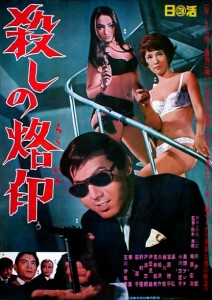Nikkatsu is reporting that famed action movie and Japanese New Wave director Seijun Suzuki passed away on February 13th, 2017 at age 93.
Suzuki began his career with Nikkatsu in 1956. He made many pictures each year, filming at a rapid pace. As time went on, he began to experiment more, both visually and otherwise, much to the chagrin of film executives. His 1967 movie Branded to Kill, a Jo Shishido hitman thriller which plays like a dangerous fever dream, was so surreal that it played a part in Nikkatsu ultimately firing Suzuki. The director took his bosses to court and won, but was subsequently blacklisted from all the major studios for a decade, when he made his 1977 return with A Tale of Sorrow and Sadness. Suzuki reached new heights of experimentation with the bizarre Taisho Trilogy, three arthouse films that mixed dark comedy, horror, and mystery to great effect. In 2005, Suzuki directed his final film, a fantasy musical starring Ziyi Zhang titled Princess Raccoon.
Suzuki’s career included other highlights such as Tokyo Drifter, Fighting Elegy, Youth of the Beast, Gate of Flesh, Underworld Beauty, Story of a Prostitute, Voice Without a Shadow, and Everything Goes Wrong. Suzuki also occasionally took on acting roles, with parts in films like Shinji Aoyama’s Embalming and SABU’s Blessing Bell.
Seijun Suzuki was a one of a kind film talent, creating some truly weird and very cool movies over the years. His films influenced the works of Quentin Tarantino, John Woo, Takashi Miike, Jim Jarmusch, and many others.
We here at City on Fire offer our condolences to Suzuki’s family and friends.




I’ve only seen two of his movies, Tokyo Drifter and Take Aim at the Police Van, and both have some truly topsy turvy plots, irreverent moments, and stunning action. He’s probably one of the most complex and interesting Japanese action directors of all time, because I feel like I may never be able to fully understand his films, as they are all more than just action films. For goodness sakes, Tokyo Drifter takes a break at one point to include a nonsensical barroom brawl that features a moment where some Japanese girls have a bunch of drunk American sailors march in place and than they whack them on the heads with bottles. Now there’s a statement on the war. Either way, it’s crazy to think he just now died, he’s been alive along time, and he has plenty of films that I’ve yet to see. RIP Suzuki.
Tokyo Drifter was my headway in Suzuki san and it’s awful that he’s gone. Feels like he had so much more to give in the world of cinema.